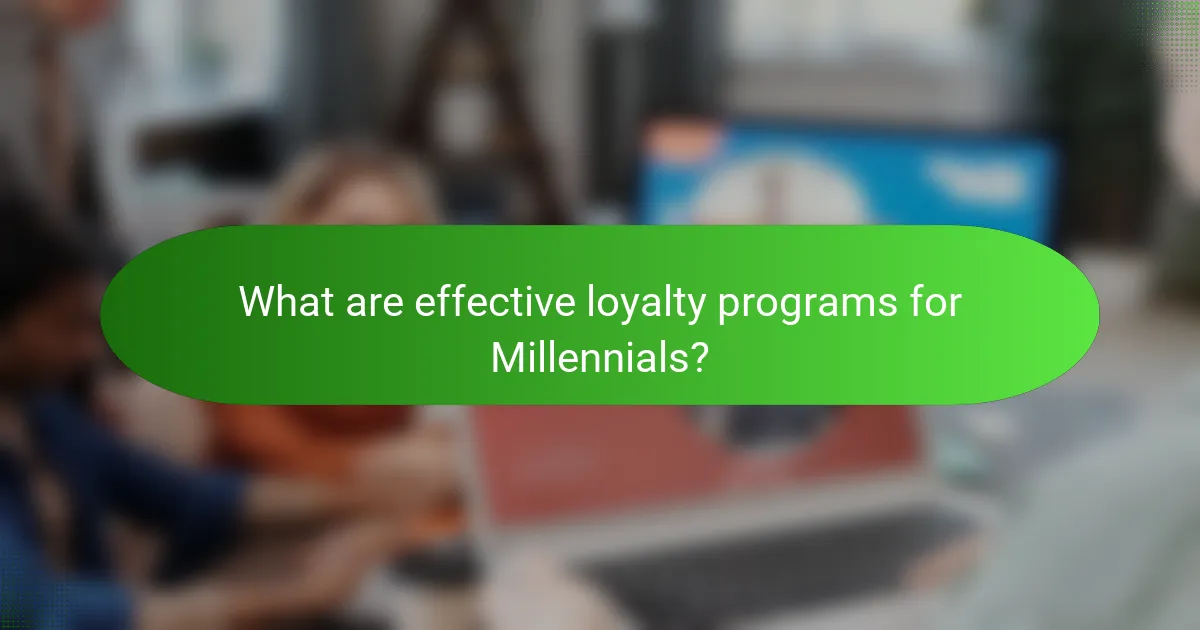In today’s competitive market, fostering brand loyalty among Millennial consumers requires a deep understanding of their values and preferences. By creating authentic connections through engagement, personalization, and community involvement, brands can build lasting relationships. Social media plays a pivotal role in this process, enabling direct interaction and trust-building that enhances loyalty over time.

How can brands build loyalty among Millennial consumers?
Brands can build loyalty among Millennial consumers by creating authentic connections through engagement, personalization, and community involvement. Understanding their values and preferences is crucial for fostering lasting relationships.
Engaging social media strategies
To effectively engage Millennial consumers, brands should leverage platforms like Instagram, TikTok, and Twitter, where this demographic spends significant time. Creating interactive content such as polls, challenges, and behind-the-scenes glimpses can enhance engagement.
Brands should also prioritize user-generated content, encouraging Millennials to share their experiences. This not only builds community but also provides authentic testimonials that resonate with potential customers.
Personalized marketing campaigns
Personalization is key to capturing Millennial attention. Brands can utilize data analytics to tailor marketing messages based on individual preferences and behaviors, making consumers feel valued and understood.
Implementing strategies like targeted email campaigns or personalized product recommendations can significantly enhance customer experience. For instance, offering discounts on items previously viewed can drive conversions and foster loyalty.
Community involvement initiatives
Millennials are drawn to brands that demonstrate social responsibility. Engaging in community initiatives, such as environmental sustainability projects or local charity events, can strengthen brand loyalty by aligning with their values.
Brands should consider collaborating with local organizations or launching campaigns that support social causes. This not only enhances brand image but also encourages Millennials to feel a sense of belonging and connection to the brand.

What role does social media play in brand loyalty?
Social media significantly influences brand loyalty by fostering direct engagement and creating community connections. Brands that effectively utilize these platforms can build trust and emotional ties with millennial consumers, enhancing their loyalty over time.
Platforms like Instagram and TikTok
Instagram and TikTok are pivotal for brands aiming to connect with millennials. These platforms emphasize visual content, making it easier for brands to showcase their identity and values through engaging imagery and videos. Brands that leverage these platforms often see higher engagement rates, as millennials prefer authentic and relatable content.
Utilizing features like Stories on Instagram or challenges on TikTok can amplify brand visibility. For instance, brands can create interactive campaigns that encourage user participation, which not only promotes the brand but also fosters a sense of community among followers.
User-generated content impact
User-generated content (UGC) plays a crucial role in building brand loyalty among millennials. When consumers share their experiences with a brand, it creates authentic endorsements that resonate more than traditional advertising. UGC can include reviews, photos, or videos that highlight real-life use of products, making the brand more relatable.
Encouraging UGC can be as simple as running contests or featuring customer stories on social media. Brands that actively engage with UGC not only enhance their credibility but also strengthen their relationship with consumers, as it shows that they value customer input and experiences.

What are effective loyalty programs for Millennials?
Effective loyalty programs for Millennials focus on personalized experiences and tangible rewards that resonate with their values. Programs that offer flexibility, community engagement, and exclusive perks tend to foster stronger connections with this demographic.
Points-based rewards systems
Points-based rewards systems are popular among Millennials as they allow consumers to earn points for purchases, which can be redeemed for discounts or free products. These systems should be straightforward, enabling users to easily track their points and understand how to earn rewards.
For example, a coffee shop might offer 1 point for every dollar spent, with 100 points redeemable for a free drink. This transparency encourages repeat visits and builds brand loyalty over time.
Exclusive member benefits
Exclusive member benefits can significantly enhance loyalty programs by providing unique experiences or products that are not available to non-members. These benefits may include early access to sales, special events, or personalized offers tailored to individual preferences.
For instance, a clothing retailer might offer members a 20% discount on their birthday or invite them to exclusive shopping events. Such perks create a sense of belonging and appreciation, which is crucial for retaining Millennial customers.

How does brand transparency affect loyalty?
Brand transparency significantly enhances customer loyalty by building trust and fostering emotional connections. When consumers perceive a brand as open and honest, they are more likely to remain loyal and advocate for the brand.
Authenticity in messaging
Authenticity in messaging means that brands communicate their true values and intentions without exaggeration or deception. Millennial consumers, in particular, value genuine narratives that reflect real experiences and commitments.
Brands can enhance authenticity by sharing behind-the-scenes content, customer testimonials, and stories that resonate with their audience. For example, a clothing brand might showcase the ethical sourcing of its materials, appealing to consumers’ desire for responsible consumption.
Open communication about values
Open communication about values involves clearly articulating a brand’s mission, ethics, and social responsibility efforts. This transparency allows consumers to align their purchasing decisions with their personal values, which is crucial for fostering loyalty.
Brands should regularly update their audience on initiatives related to sustainability, community engagement, or social justice. For instance, a beauty brand might publish reports on its environmental impact or charitable contributions, reinforcing its commitment to transparency and accountability.

What are the key attributes Millennials seek in brands?
Millennials prioritize authenticity, transparency, and values alignment when choosing brands. They gravitate towards companies that demonstrate commitment to sustainability and social responsibility, reflecting their own beliefs and lifestyle choices.
Sustainability practices
Millennials are increasingly drawn to brands that implement sustainable practices, such as using eco-friendly materials and minimizing waste. They appreciate companies that actively reduce their carbon footprint and promote environmental stewardship.
To appeal to this demographic, brands can adopt practices like sourcing materials responsibly, offering recycling programs, or committing to carbon neutrality. For example, a clothing brand that uses organic cotton and offers a take-back program for old garments can resonate well with Millennial consumers.
Social responsibility
Social responsibility is another critical attribute for Millennials, who prefer brands that contribute positively to society. This includes supporting local communities, advocating for social justice, and engaging in charitable initiatives.
Brands can enhance their appeal by partnering with non-profits, donating a portion of profits to social causes, or launching campaigns that raise awareness about important issues. For instance, a food company that donates meals for every product sold can effectively connect with Millennial values.

How can brands leverage influencer marketing?
Brands can effectively leverage influencer marketing by collaborating with individuals who resonate with their target audience, particularly millennials. This strategy involves creating authentic connections through relatable influencers and engaging storytelling that aligns with brand values.
Partnerships with relatable influencers
Building partnerships with influencers who share similar values and lifestyles as the target audience is crucial. These influencers should have a genuine connection with their followers, which can enhance brand credibility. For example, a sustainable fashion brand might collaborate with eco-conscious influencers to reach environmentally aware consumers.
When selecting influencers, consider their engagement rates and audience demographics rather than just follower counts. A micro-influencer with a loyal following can often drive higher engagement than a celebrity with millions of followers but lower interaction rates.
Authentic storytelling through influencers
Authentic storytelling is essential in influencer marketing, as it allows brands to connect emotionally with consumers. Influencers can share personal experiences related to the brand, making the message more relatable and impactful. For instance, a health and wellness brand might have an influencer share their fitness journey while using the brand’s products.
Brands should encourage influencers to create content that feels genuine and spontaneous rather than overly polished. This approach can include behind-the-scenes glimpses, real-life testimonials, or user-generated content that showcases the product in everyday settings. Such authenticity can significantly enhance brand loyalty among millennial consumers.
